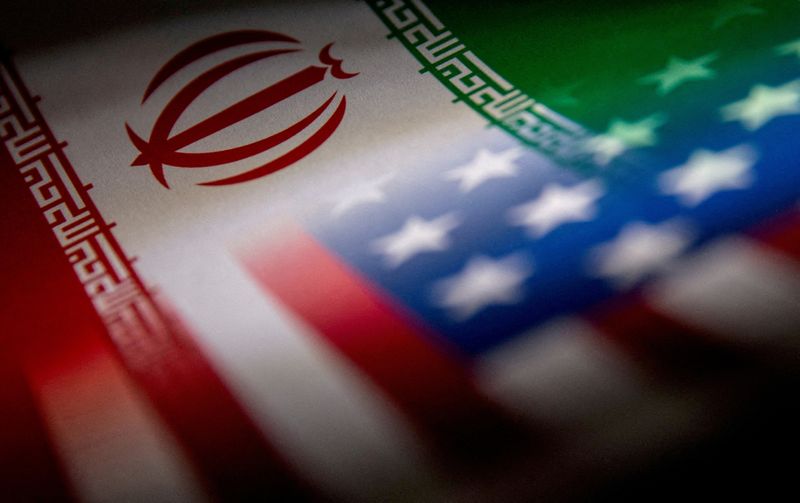
© Reuters. FILE PHOTO: The Iranian and U.S. flags are seen printed on paper in this illustration taken January 27, 2022. REUTERS/Dado Ruvic/Illustration/File Photo
By Andrew Mills, Humeyra Pamuk and Parisa Hafezi
DOHA/NEW YORK (Reuters) – Five Americans freed from Iran made an emotional return to the United States on Tuesday ending their imprisonment “nightmare”, a day after they were swapped for five Iranians held in the U.S. and the unfreezing of $6 billion in Iranian funds.
Coming off the plane, the returning Americans were embraced by family and friends with smiles, laughs, and visible emotion, video footage from the airport showed. One of the returnees briefly waved a small Stars and Stripes handed to him.
“The nightmare is finally over,” said Babak Namazi, speaking with his arm around his returning brother Siamak at Fort Belvoir, Virginia.
The welcome ceremony followed a carefully choreographed exchange, agreed after months of Qatar-mediated talks, that was triggered on Monday when the funds that had been blocked in South Korea were wired, via Switzerland, to banks in Doha.
After the transfer was confirmed, the five U.S. prisoners plus two relatives took off on a Qatari plane from Tehran, at the same time as two of the five Iranian detainees landed in Doha on their way home. Three Iranians chose not to go to Iran.
The deal removes a point of friction between the United States, which brands Tehran a sponsor of terrorism, and Iran, which calls Washington the “Great Satan”.
But it is unclear whether it will bring the two adversaries, which have been at odds for 40 years, closer on any other issues, such as Iran’s nuclear program and its backing for regional militias or the U.S. military presence in the Gulf and U.S. sanctions.
The freed Americans include U.S.-Iranian dual citizens Siamak Namazi, 51, and Emad Sharqi, 59, both businessmen, and Morad Tahbaz, 67, an environmentalist who also holds British nationality. Two of them have not been publicly identified.
‘HUMANITARIAN ACTION’
U.S. President Joe Biden welcomed the return of the prisoners home in a statement on Monday but his administration also announced fresh U.S. sanctions.
“We will continue to impose costs on Iran for their provocative actions in the region,” he said.
Iranian President Ebrahim Raisi, who was in New York for the annual U.N. General Assembly, called the swap a humanitarian action. “It can certainly be a step based upon which in the future other humanitarian actions can be taken,” he added.
Biden, a Democrat, has faced criticism from Republicans over the deal. House Foreign Affairs Committee Chairman Michael McCaul, a prominent Republican, said the transfer of the $6 billion could encourage Iran to detain more U.S. citizens.
Biden aides say the money belongs to Iran and is being transferred from restricted South Korean accounts to restricted accounts in Qatar, which will monitor the cash to ensure it is spent on humanitarian goods not items under U.S. sanctions.
Relations between the United States and Iran have been especially bitter since 2018 when then-President Donald Trump pulled out of a deal aimed at curbing Tehran’s nuclear ambitions and toughened U.S. sanctions.
Washington suspects Iran’s nuclear program may be aimed at developing nuclear arms, a charge Iran denies.
U.S. Secretary of State Antony Blinken left the door open to nuclear diplomacy, but suggested nothing was imminent.
U.S. analysts were sceptical about prospects for progress, particularly with a U.S. election looming in 2024.
“The prisoner swap does likely pave the way for additional diplomacy around the nuclear program this fall, although the prospect for actually reaching a deal is very remote,” said Henry Rome of the Washington Institute for Near East Policy.








